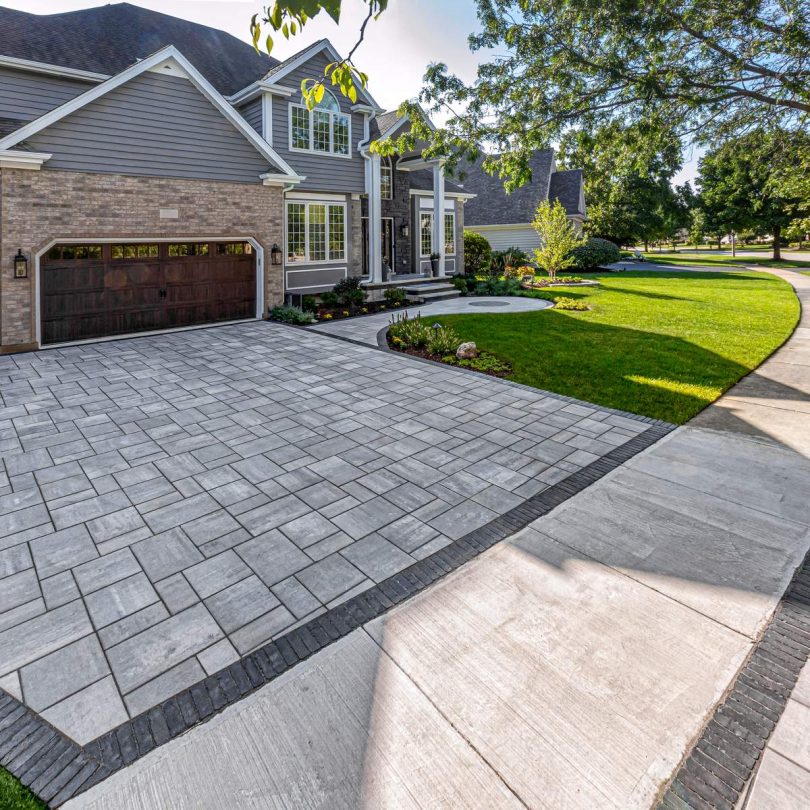When it comes to enhancing the curb appeal of your home, the driveway is often an overlooked aspect. However, it plays a significant role in not only aesthetics but also functionality. Paving stone and concrete are two often used driveway options, and each has its own set of perks and factors to keep in mind. In this article, we will delve into the details of both options to help you decide which is right for you.
Contents
- 1 Advantages of Paving Stone Driveways
- 2 Advantages of Concrete Driveways
- 3 Factors to Consider When Choosing Between Paving Stones and Concrete
- 4 Installation Process
- 5 Maintenance Comparison
- 6 Environmental Impact
- 7 Conclusion
- 8 FAQ’S
- 8.1 Are paving stone driveways more expensive than concrete driveways?
- 8.2 Which option is better for extreme weather conditions?
- 8.3 How often do I need to reseal a concrete driveway?
- 8.4 Can I install paving stones on my own, or should I hire a professional?
- 8.5 Do concrete driveways limit design options?
Advantages of Paving Stone Driveways
Durability
Paving stone driveways are known for their exceptional durability. They can withstand heavy loads, making them suitable for areas with high traffic. Their strength and longevity are unmatched, ensuring your investment lasts for years to come.
Aesthetic Appeal
One of the most significant advantages of paving stone driveways is their visual appeal. They come in various shapes, colors, and patterns, allowing for customization that can complement your home’s design. The result is a stunning driveway that adds value and charm to your property.
Easy Maintenance
Paving stone driveways are relatively easy to maintain. If a stone becomes damaged, you can replace it individually, saving time and money. Additionally, they are resistant to cracks and stains, maintaining their pristine appearance over time.
Advantages of Concrete Driveways
Affordability
Concrete driveways are cost-effective when compared to paving stones. If you are working with a limited budget, concrete is a practical choice. It offers a clean, simple look and functionality without breaking the bank.
Longevity
Driveways made of concrete are noted for their durability; with proper maintenance, they can last for centuries. While they may lack the intricate aesthetics of paving stones, they are robust and reliable.
Minimal Maintenance
Concrete driveways require minimal maintenance, often only needing sealing every few years. They are resistant to weeds and grass growth, making them a low-maintenance option for homeowners.
Factors to Consider When Choosing Between Paving Stones and Concrete
When deciding between a paving stone and a concrete driveway, several factors should influence your choice:
Budget
Consider your budget carefully. Paving stone driveways are more expensive upfront but offer long-term savings due to their durability. Concrete is more budget-friendly initially but may require more maintenance over time.
Climate and Weather Conditions
Your local climate plays a role in choosing the right material. Paving stones can withstand freeze-thaw cycles better than concrete. Consider the weather in your area when making your decision.
Design Preferences
Your personal style and the overall aesthetic of your home should guide your choice. Paving stones offer more design options, while concrete provides a clean and classic look.
Installation Process
Paving Stone Driveway Installation
Installing a paving stone driveway can be a bit more labor-intensive. It involves laying individual stones meticulously. However, the end result is a beautiful, customized surface.
Concrete Driveway Installation
Concrete driveways are typically faster to install. A concrete mix is poured, leveled, and cured, resulting in a smooth surface. The process is efficient and less time-consuming.
Maintenance Comparison
Both options are relatively low-maintenance. Paving stones may require occasional re-leveling, while concrete driveways need resealing every few years. Overall, the maintenance required is reasonable for both choices.
Environmental Impact
Concrete production can have a higher environmental impact due to the energy and resources required. Paving stones, on the other hand, are often made from natural materials and can be more eco-friendly. Consider your environmental concerns when making your decision.
Conclusion
There is no right or wrong choice in the argument between concrete and paving stone driveways; it all depends on your priorities and the situation. Paving stones offer beauty and long-term durability but come at a higher initial cost. Concrete driveways are budget-friendly and low-maintenance but may not offer the same level of customization. Consider your budget, climate, and design preferences to make the right decision for your home.
FAQ’S
Are paving stone driveways more expensive than concrete driveways?
Paving stone driveways are generally more expensive upfront compared to concrete driveways. However, their durability and aesthetic benefits often make them a cost-effective choice in the long run.
Which option is better for extreme weather conditions?
Paving stone driveways are better suited for extreme weather conditions, as they can withstand freeze-thaw cycles better than concrete. Their durability makes them a reliable choice in challenging climates.
How often do I need to reseal a concrete driveway?
Concrete driveways typically require resealing every few years, depending on factors such as weather exposure and usage. Proper maintenance ensures the longevity and appearance of the driveway.
Can I install paving stones on my own, or should I hire a professional?
While DIY installation of paving stones is possible, it can be labor-intensive and requires precision. Hiring a professional is advisable to ensure a well-constructed and visually appealing driveway.
Do concrete driveways limit design options?
Concrete driveways offer a clean and classic look, but they may limit design options compared to paving stones. Paving stones provide more versatility in terms of shapes, colors, and patterns, allowing for greater customization.







